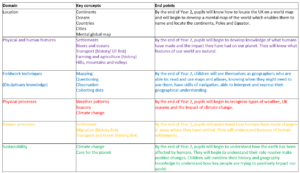GEOGRAPHY
Our vision for Geography at Knaphill Lower School:
Our vision for geography at Knaphill Lower School is based on children developing excellent geographical knowledge and understanding, through well-sequenced, well-taught lessons, which include opportunities for children to develop their own sense of place and belonging in the world. Our geography teaching will create global citizens, who can think both critically and creatively, to solve problems of sustainability and the future of the planet, which we see as a key concept within our Knaphill curriculum. The geography classroom is the world’s largest; it encompasses the whole Earth with its power to create immense beauty and terrible danger, as well as the wonderful diversity of its inhabitants. Through teaching geography, we guide pupils in their developing understanding and tolerance of the world around them – the people, the places, the processes – and nourish their curiosity. We see geography as a crucial opportunity to develop our children’s character, as children are encouraged to show curiousity and fascination and they learn about the place in which they live, about their community, as well as beginning to understand the richness and diverse beauty of our world. Our geography curriculum will equip pupils with knowledge about diverse places, people, resources and natural and human environments, together with a foundation of understanding of the Earth’s key physical and human processes, which will prepare them for their next stage of geographical education.
Our curriculum is relevant to our pupils equipping them with the skills to interpret their own part of the world both locally and their personal connections globally. Our curriculum aims to broaden horizons, challenge prejudices and develop a sense of a common humanity.
As geographers, our pupils will work both inside and outside the classroom to support the development of their character and core geographical skills. They will conduct fieldwork both within the school ground, in our locality and further afield in order to provide real life context to our learning. Through geographical enquiry they will learn to ask and answer questions, collect and analyse data, consider solutions to current geographical issues and engage in debates and discussions. We will instill in them a resilient and open attitude to learning which will serve them well as they continue studying geography in the future.
The intent of geography lesson at Knaphill Lower School is that children develop:
- An excellent knowledge of where places are and what they are like.
- An excellent understanding of how much human and physical environments are interrelated.
- An extensive base of geographical knowledge and vocabulary.
- With support, begin to draw conclusions about places and geographical concepts.
- Skills for successful fieldwork.
- A passion for and commitment to the subject, and a real sense of curiosity to find out about the world and the people who live there.
- An understanding of their place in the world and their responsibility for caring for our planet.
Knaphill Lower School – Curriculum Drivers: Values
Throughout all curriculum subjects, children are given opportunities to apply to Knaphill Lower School values in their learning.
In Geography, key values have been identified as:
- Curiosity – this value sits at the centre of geography as children explore the world beyond their classroom. Children need to question why our world is as it is, as well as trying to understand their impact of our planet.
- Responsibility – through our geographical knowledge around human features and sustainability, children will begin to understand their responsibility for protecting planet. Children will also take responsibility for the future as they take part in the 2041 project to become Champions of Antarctica in Year 2.
- Equality – through our learning about our locality, the United Kingdom and comparative studies of a village in Zambia and Antarctica, children will begin to further understand their own world and how resources are not always distributed equally.
Geography Domains and Concepts
To ensure that the most essential knowledge is selected within the Geography curriculum, the Geography Leader has used research and work with other Geography leaders across the trust to determine key geographical domains of knowledge and key concepts.




